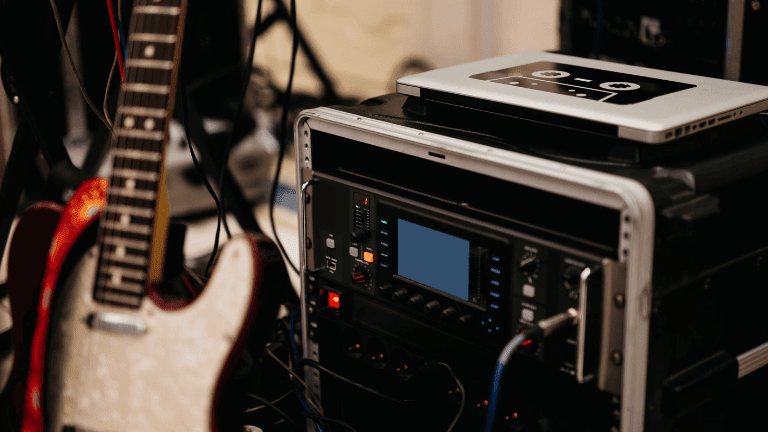
How are you going to create the budget for recording an album in 2020? And, more importantly, how much are you going to spend overall? The immediate answer is somewhere between nothing (it is entirely possible to create an album for no money) to £30,000 and upwards.
That’s a lot of money in 2020, but in historical terms it’s peanuts. My album “Jam” which was released in 1993 cost at least three times that. We would have probably spent £30,000 on the preliminary demos before tracking the actual record. However, we would have been selling CDs for £20 which were manufactured for 25p. There were huge margins, and we do not have this luxury today, hence there are smaller budgets and different approaches to monetizing music.
Let’s pause and think about this, recording an album is secondary to the important aspects which are songwriting and pre-production. This is where the album is made, and these two things are entirely free. With that in mind, let’s examine the tips which will facilitate the budgeting of your album.
We are solely talking about making a record, the promotion, marketing, and social campaigns will be dealt with in another video. Right now, let’s formulate the budget which will get this record made. I want to break this down into four financial categories;
What do you do if you have nothing to work with? It may be surprising, but you are actually in a strong position, some of the best music ever produced has been made in similar circumstances. Very often the things that restrict your art are the primary contributors to the reasons why it becomes great. Diamonds are formed under extreme heat and pressure, and music is the same.
We have five stages to consider; writing, pre-production, recording, mixing and mastering. All of this stuff can be done at home, it can be done in garage band, you can borrow mics and gear to get the thing done. The only thing that will restrict you is your creativity and imagination. If the songs are great, then the album will be a hit. Can it be done for free? It absolutely can.
All the band members have chipped in, you have a small budget and in essence a homemade album. You now have a few options that will upgrade your art, it’s essential to prioritise. With a few hundred quid, you can’t do everything and so you need to decide on what will make the biggest difference, I would recommend the mixing and mastering.
This allows you to give a home-recorded album to someone with a bit more gear and experience who can step it up at the mix stage. This could make a fundamental difference in the quality of the record. This immediate upgrade is going to cost hundreds of pounds as opposed to thousands.
When working with these limited budgets you need to pick battles that you can win. There is no point in spreading yourself too thin. Take a few hundred quid and put it into something that will count. This will undoubtedly be the mixing and mastering.
What happens if a couple of band members have day jobs and between you, there is slightly more to throw at the project. This is not a huge budget, so you need to make it count. With this extra bit of capital, you have two choices and your decisions depend on the record you are making.
If it's a live based indie or rock record, the drum sound will make the most difference. However, if it's pop or electronic orientated put your money into the mix. When I say drum sound, I’m specifically talking about tracking in a world-class studio, you will be paying for an excellent sounding room, a competitive mic collection, a brilliant desk, some industry-standard outboard, and an experienced engineer. If you can also get a bit of bass and rhythm guitar, that's a bonus. However, let’s concentrate on making the drums great.
Due to the fact you have planned this album carefully before you have even started the recording process, we will not need as much time in the studio. This means that with a limited budget you can still afford to use some of the world's best studios. You could look at studios like Rockfield in Wales for example, where major albums have been tracked by the likes of Queen, Oasis and Royal Blood. With a budget of two to three thousand pounds, there is nothing to stop you from being at a studio in that league.
What do you if money is no object and there is an unlimited budget? It may be surprising but after the £30,000 threshold, you do not get much more for your money. At this point, you can work with some of the world's best producers, engineers in the top studios for very affordable prices these days.
You need to find the right producer and engineer, to do that you need to conduct research, google them, ring them up and make a deal. You should be expecting to pay somewhere between £200-£300 per day for an experienced and current producer.
The individual costs for recording are comprised of; songwriting/pre-production, the producer, the recording process (studio rates), mixing and the mastering. It’s that simple, if we allocate for this then its job done.
It's important to allocate the budget for this and cap it, as recording is an open-ended process and budget control can go out of the window very quickly. To illustrate the point, here is a simple budget that I have used;
Songwriting and Pre- Production - £0
Producer (10 days) - £2.5K
Recording Drums and Bass (3 days in a higher-end studio) - £1.25K
Tracking (7 days in a cheaper studio) - £1K
Mixing - £1.2K
Mastering - £350
Total - £6,250
In the same way that you have a plan for how to spend your money, a plan for how you spend your time is needed. As we all know, time is money. Most artists think that a record is started the day they set foot in the studio; this is not true. It commences before that, in the rehearsal rooms where you take the songs and start to analyse the arrangements and parts.
The great thing about the pre-production phase is that it is free. If you have your pre-production, recording, mixing, and mastering stages, a logical way of segmenting your time is to spend a longer period (a month to six weeks) getting the arrangements right. Then record quickly in ten days, mix in five, and then send it for mastering for a one day turn around. Get it done in two months, job done.
Thanks for reading, if you are interested in learning more and serious about progressing in your career as a musician please join us at WaterBear HQ for an Open Day or Order a Prospectus.

- ‘Water bear’ is the common name for a Tardigrade.
- Tardigrades are micro creatures, found everywhere on earth.
- They are the most resilient creatures known.
- They can survive and adapt to their surroundings, even in outer space.
- Their resilience and ability to adapt and survive inspires us in everything we do. We love them.


WaterBear Education Ltd, Hanover House,
118 Queens Road, Brighton BN1 3XG, UK Map
Email: info@waterbear.org.uk
Tel: +44 (0) 1273 726230
WaterBear Sheffield, Unit 4, Gatecrasher,
49 Eyre Lane, Sheffield S1 4RB, UK
Email: infosheffield@waterbear.org.uk
Tel: +44 (0) 1143 992720

WaterBear Education Ltd, Hanover House,
118 Queens Road, Brighton BN1 3XG, UK Map
Email: info@waterbear.org.uk
Tel: +44 (0) 1273 726230
WaterBear Sheffield, Unit 4, Gatecrasher,
49 Eyre Lane, Sheffield S1 4RB, UK
Email: infosheffield@waterbear.org.uk
Tel: +44 (0) 1143 992720
- ‘Water bear’ is the common name for a Tardigrade.
- Tardigrades are micro creatures, found everywhere on earth.
- They are the most resilient creatures known.
- They can survive and adapt to their surroundings, even in outer space.
- Their resilience and ability to adapt and survive inspires us in everything we do. We love them.
